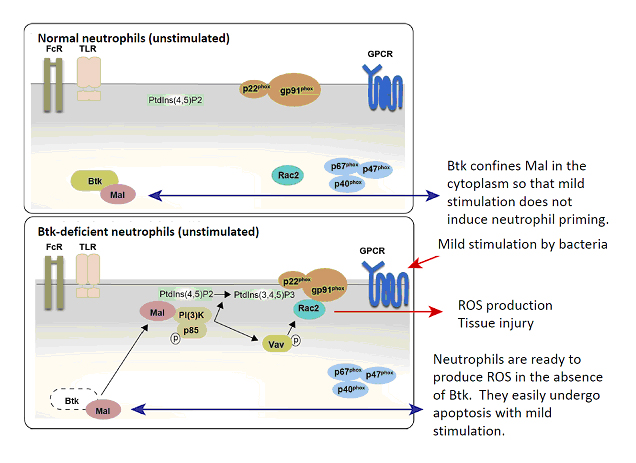“Identification of a key regulator molecule that prevents neutrophil over-activation”

Tomohiro Morio
Associate Professor
Department of Pediatrics and Developmental Biology
Graduate School of Medical and Dental Sciences (right)
Fumiko Honda
Graduate Student
Department of Pediatrics and Developmental Biology
Graduate School of Medical and Dental Sciences (left)
Highlights:
| * | The molecular mechanism of neutropenia induced by mild infection in patients with X-linked agammaglobulinemia, BTK (Bruton's tyrosie kinase) deficiency, was elucidated. |
| * | The priming response of neutrophils, major players in bacterial killing in human immune system, was found fine-tuned by the BTK kinase. |
| * | Production of reactive oxygen species (ROS) from human neutrophils was controllable with treatment with a BTK kinase inhibitor or with transduction of recombinant BTK protein via cell permeable peptide. |
| * | The results obtained from this study will lead to the development of novel therapy for controlling a variety of diseases caused by inflammation triggered by neutrophil-derived ROS. Successful manipulation of BTK or Mal may be also used for neutropenia induced by sepsis in the future. |
Summary and significance of this study:
The data present BTK as a gatekeeper of neutrophil response and as an important signal component in human neutrophils, associating with MAL in the cytoplasm and preventing translocation of MAL to plasma membrane in steady state. This study also elucidated a detailed signaling system in the priming stage of BTK-deficient neutrophils and BTK-sufficient neutrophils. ROS production and subsequent apoptosis of XLA neutrophils was efficiently inhibited by transduction of BTK protein fused to a cell-permeable peptide. In contrast, augmented ROS production was achievable by suppressing BTK function with a BTK inhibitor.
A variety of diseases are associated with neutrophil over-activation or excessive ROS production, leading to severe organ damage. High ROS production is also related to atherosclerosis, senescence, and other disorders. Severe bacterial infection induces massive cellular apoptosis of neutrophils and damage of tissues such as the lung and the liver. The excessive neutrophil apoptosis results in neutropenia, making control of infection further difficult.
It is expected that neutrophil ROS production in many diseases can be controlled in the future by manipulation of BTK, MAL, and other molecules involved in the neutrophil BTK-MAL pathway.
Figure: NADPH oxidase complex in the absence or presence of BTK in human neutrophils

*1 BTK is a member of the Tec family kinases expressed in hematopoietic cells such as B-cells, monocytes, macrophages and neutrophils. It plays a crucial role in cell survival, proliferation, differentiation and apoptosis, especially in B-lineage cells.
*2 X-linked agammaglobulinemia (XLA) is a primary immunodeficiency characterized by a profound defect in B cell development and by a lack of immunoglobulin production. XLA is caused by a mutation in BTK gene. The patients with XLA suffer from invasive pyogenic bacterial infections as well as recurrent sinus and pulmonary infections caused by Streptococcus pneumoniae, Haemophilus influenzae, and Moraxella catarrhalis.
Correspondence to:
Department of Pediatrics and Developmental Biology
Tokyo Medical and Dental University Graduate School of Medical and Dental Sciences
1-5-45 Yushima, Bunkyo-ku, Tokyo, Japan 113-8519
Phone: +81-3-5803-5245
E-mail: tmorio.ped(at)tmd.ac.jp
*Please change (at) in e-mail addresses to @ upon sending your e-mail to the contact personnel.

